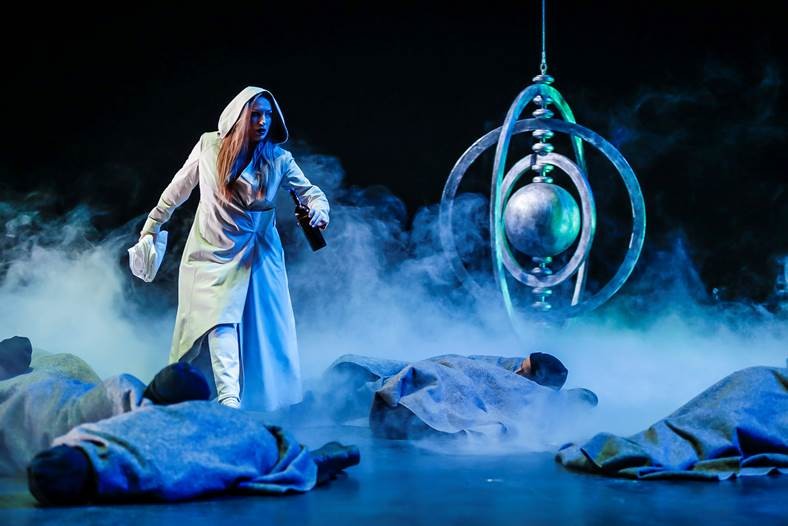
Electra is one of the oldest existing plays in Western literature. Some version of it is attributed to each of ancient Greeks' towering tragedians: Sophocles, Euripides and Aeschylus. Through the centuries, the mythological revenge tale has inspired artists as varied as Goethe to Frank Miller, who named Daredevil's femme fatale after her, along with dozens of play, opera and musical adaptations. Hell, even Jung tried to wrap his grubby little fingers around the iconic character with “The Electra Complex,” his theory for daughters' psychosexual competition with their mothers for daddy's attention.
So, with it so engrained into the popular (if kinda arty) consciousness, there's no need to do another version right? Not according to Mihai Maniutiu, an internationally renowned director who hails from Romania, and who is currently a theater professor at UC Irvine. This production features guest artists Ioan Pop and Iza Group, who bring something a bit different to this mounting of an ancient Greek tragedy: Romanian folk music which is integrated into the chorus, whose members all play instruments. We caught up with Dr. Maniutiu, and picked his big Romanian brain.
]
OC Weekly (Joel Beers): Anyone with an interest in drama is familiar with the Sophocles play. But what about those who are not as familiar?
Mihai Maniutiu: I don't think it is necessary to be familiar with Sophocles' play in order to follow (breathlessly, I hope) this story of revenge, with its suspense and its reversals of fortune. It is a paradigmatic story which reveals its challenge in the first lines of the performance; it is a sort of ritualistic thriller.
(The play) has two main components: it first aims to explore theatrical rituals with the support of ancient Romanian folk music, which propels the acting, stimulating the generative energy of the play. Second, it is a quest for the musical spirit of ancient Greek tragedy. I hope that the intensity of acting and playing music and the synergy of those on stage will be contagious, and the spectators will walk away feeling a new kind of vital energy. In my opinion this is the aim of theatre: to disturb, to raise questions, and to inspire feelings never felt before.
Not many productions of ancient Greek tragedy feature live musicians on stage. Why does yours?
Most people simply forget or do not know that at its origin Greek tragedy – performed in those huge stone amphitheatres in the open air – used a lot of music, both instrumental and vocal.
I think that having five live musicians onstage lends authenticity to the musical skeleton of the show. At the same time, music – just as in the ancient performances of Greek tragedy – is the perfect vehicle to convey emotion, to make words penetrate deeper in the minds and souls of the spectators. The music is a flow of energy depicting – in an extremely emotional and instinctive way – the contradictory feelings of the characters.
There is a reason these plays are still staged more than 2,000 after they were written. What explains their resonance to contemporary theater practitioners?
Because they contain essential stories of humankind about love, hatred, power struggle, belief and unbelief in God(s), and the transgression of laws and taboos (be they social, moral or religious). That's why theatre practitioners love to rely upon ancient stories in order to question and explore contemporary issues, which is what I'm doing here. The conflict in Electra is not one between good guys and bad guys, between those who are right and those who are wrong; rather, the conflict lies deep within individuals who are equally right (or equally wrong). This is the paradox of the tragic. So, as a contemporary spectator, it is difficult to choose one camp or another. Orestes and his sister have to kill Clytemnestra (the killer of their father). They have to do this in order to obey the archaic laws of the land that demand this act of revenge, but in doing so they kill their mother — committing the most terrible crime a human being may commit. This is how tragedy's paradox plays out in ELECTRA.
As a native of Romania, it's only natural that you use Romanian folk music as the music in this play. What can you tell a layman about Romanian folk music? How important has it been, and does it remain, to the Romanian culture?
Almost every historical and geographical region of Romania (Transylvania, Moldavia, Wallachia and others) has its own ancient musical patrimony. The music played in ELECTRA comes from Maramures,a remote region of North-Western Transylvania. This music is very special within the context of ancient Romanian folk music, because it assimilates Ukrainian and Jewish folk music in a unique way, the two populations having shared land for centuries. This mixture of cultures demonstrates the impact of diversity, and makes us aware that various cultures share the same human values despite their apparently different means of expression. Thus, this project is also a meditation on the cross-cultural approaches that ancient Greek tragedy is generating when performed nowadays. In Maramures, as in many other rural areas of Romania, music is a central element in the rituals and ceremonies that mark our shared human existence: births, weddings, deaths, and other societal landmarks.
UC Irvine Claire Trevor Theatre. Park in the Mesa Parking Structure, 4004 Mesa Road, Irvine, (949) 824-2787 Opens Sat., 8 p.m. Sun., 2 p.m.; Wed., 7:30 p.m.; Thurs.-Sat., 8 p.m. Closes March 15. $11-$15. http://drama.arts.uci.edu/tickets
Follow us on Twitter at @OCWeeklyMusic and like us on Facebook at Heard Mentality.
Joel Beers has written about theater and other stuff for this infernal rag since its very first issue in, when was that again???

